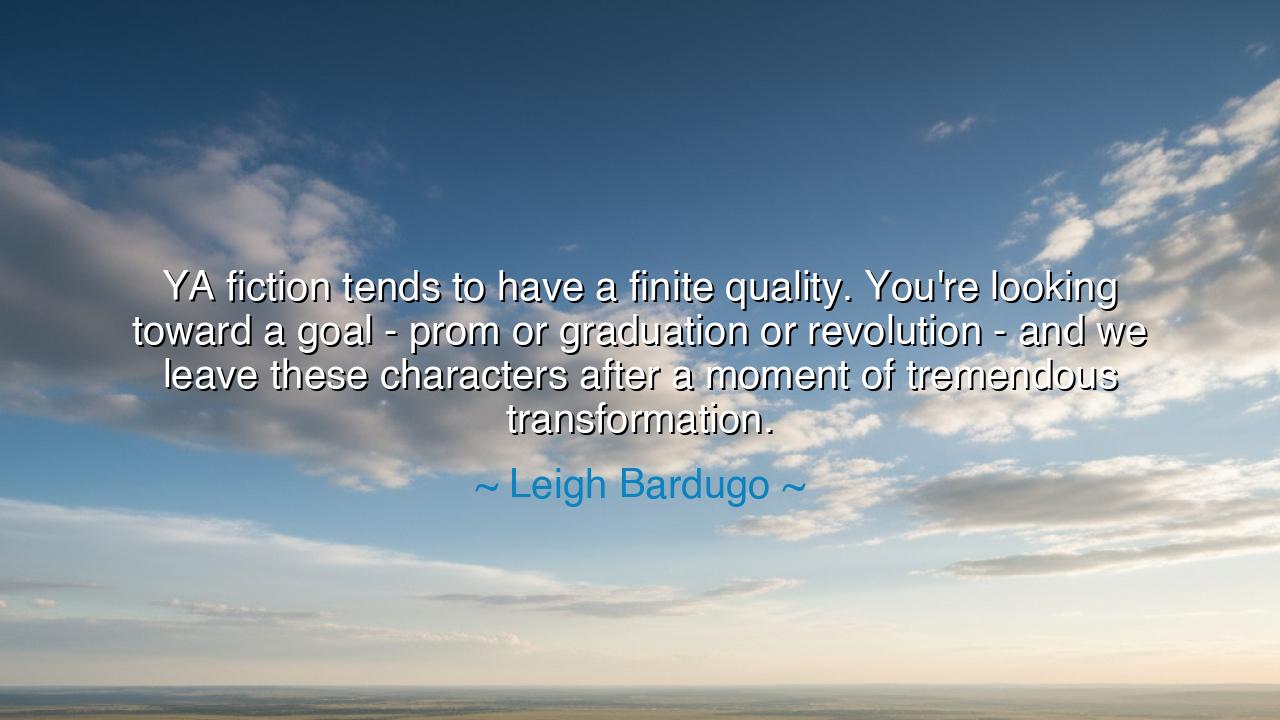
YA fiction tends to have a finite quality. You're looking toward
YA fiction tends to have a finite quality. You're looking toward a goal - prom or graduation or revolution - and we leave these characters after a moment of tremendous transformation.






In the reflective and wise words, “YA fiction tends to have a finite quality. You're looking toward a goal — prom or graduation or revolution — and we leave these characters after a moment of tremendous transformation,” Leigh Bardugo speaks not merely about literature, but about the very structure of human growth and destiny. Beneath her insight into storytelling lies a universal truth: that youth, like every sacred chapter of life, is defined not by endlessness, but by transformation — by the moment when innocence meets awakening, when potential hardens into purpose, and when one era of self gives way to the next.
The origin of this quote arises from Bardugo’s experience as a writer of young adult (YA) fiction, a realm filled with dreams, rebellion, and metamorphosis. Her works — from Shadow and Bone to Six of Crows — dwell in the space between adolescence and adulthood, where choices shape fate and courage forges identity. She recognizes that YA fiction, unlike stories of adulthood or old age, burns with the intensity of the finite, the knowledge that its heroes will not remain forever on the threshold. The prom, the graduation, the revolution — these are not simply plot points, but symbols of culmination, the ceremonial fires through which youth passes into maturity.
Yet Bardugo’s reflection also reaches beyond literature into the heart of life itself. For every human being, there exists this same narrative arc — a season when we march toward defining moments, believing them to be endings when in truth they are beginnings in disguise. The young warrior in a story might face a final battle, but the reader knows that what comes after — the quieter years of consequence — lies beyond the page. So too in our lives do we stand at such thresholds: the wedding, the graduation, the birth of a child, the loss of a parent. We live as if the story concludes there, yet life keeps turning its pages, and each triumph or tragedy is but a prelude to another awakening.
The ancients, too, understood this rhythm. Consider Alexander the Great, who at twenty conquered empires yet remained forever a youth in the eyes of history. His story, like the heroes of YA fiction, ends at the height of transformation — the world before him, his destiny sealed in brilliance and brevity. We do not see the man he might have become; we remember him forever as the flame that burned brightest before it faded. Bardugo’s words remind us that this is the nature of youthful stories: they close upon the moment of becoming, not of being. Their beauty lies in their incompleteness, for it is in the open horizon of youth that the soul feels its most potent possibilities.
But this finite quality also reveals a deeper wisdom about art and the human spirit. We are drawn to stories that end with transformation because they mirror the pattern of rebirth that underlies all existence. The caterpillar becomes the butterfly, the student becomes the teacher, the rebel becomes the ruler. Each phase of life demands the surrender of one identity so that another may rise. YA fiction captures this moment — the surrender and the ascent — in its purest form, unburdened by cynicism, untempered by age. It is the literature of becoming, a mirror for all who stand upon the threshold of change.
Bardugo’s reflection also speaks to the sacred art of letting go. In stories, as in life, we must learn to leave our characters — and our younger selves — at their moment of transformation. Parents watching their children graduate, teachers bidding farewell to students, or friends parting after years of shared growth — all feel the ache of this truth. To love youth, to write it, to live it, is to accept that it cannot last. And yet, in that impermanence lies its holiness. The fleeting nature of the moment is what gives it meaning. The ancients knew this, too — they celebrated the brief bloom of the rose precisely because it was doomed to fade.
The lesson in Bardugo’s words is eternal: embrace the finite nature of your own chapters. Do not cling to what was, nor mourn what must end, but honor the transformation each phase demands. Every ending — whether of youth, of love, or of innocence — is not loss, but passage. The fire that consumes one stage of life kindles the next. To live fully is to live like the heroes of YA fiction: to strive toward your revolution, your graduation, your awakening — and when that moment comes, to step forward with courage into the unknown that follows.
And the practical action is this: when you find yourself at life’s thresholds — the moments that promise both fear and renewal — do not seek to prolong them, but to inhabit them completely. Celebrate each transformation, however brief. Record the lessons of your youth, the dreams that moved you, the friendships that defined you, and let them become the soil for what comes next. For as Leigh Bardugo teaches, every story of becoming must one day end — but in that ending, the eternal story of the soul begins anew.






AAdministratorAdministrator
Welcome, honored guests. Please leave a comment, we will respond soon